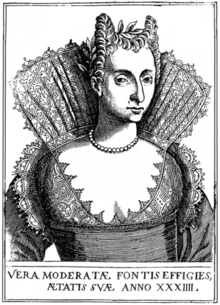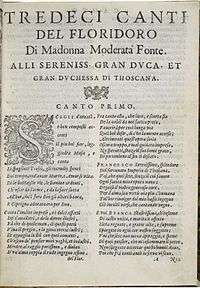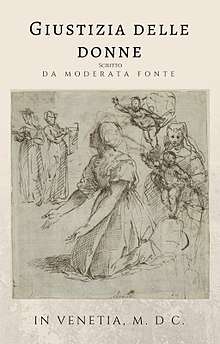Moderata Fonte
| Modesta di Pozzo di Forzi | |
|---|---|
 | |
| Born | 1555 |
| Died | c. 1592 |
| Pen name | Moderata Fonte |
| Language | Italian |
| Nationality | Italian |
| Period | 16th century |
| Subject | Feminism |
| Notable works | The Worth of Women |
|
| |
Moderata Fonte, pseudonym of Modesta di Pozzo di Forzi (or Zorzi), also known as Modesto Pozzo (or Modesta, feminization of Modesto),[1] (1555–1592) was a Venetian writer and poet.[2] Besides the posthumously-published dialogues, Giustizia delle donne and Il merito delle donne (gathered in The Worth of Women, 1600) for which she is best known, she wrote a romance and religious poetry. Details of her life are known from the biography by Giovanni Niccolò Doglioni (1548-1629), her uncle, included as a preface to the dialogue.[3]
Life

Pozzo's parents, Girolamo da Pozzo and Marietta da Pozzo (née dal Moro),[4] died of the plague in 1556, when she was just a year old, and she and her older brother Leonardo were placed in the care of their maternal grandmother and her second husband. She spent several years in the convent of Santa Marta where, thanks to her extraordinary memory, she was often displayed as a child prodigy. She was able to repeat long sermons she had heard or read only once.[5] At the age of nine she was returned to her grandmother’s family where she learned Latin and composition from her grandfather, Prospero Saraceni, a man of letters, as well as from her brother, Leonardo.[6] Her brother also taught her to read and write in Latin, draw, sing, and play the lute and harpsichord.
On 15 February 1582, at twenty-seven years old, Pozzo wed Filippo de’ Zorzi. Their marriage appears to have been a particularly good one because de’ Zorzi returned her dowry a year and a half after their wedding.[7] An official document dated October 1583 states that de’ Zorzi returns the dowry “thanks to his pure kindness and to the great love and good will that he has felt and feels for” Pozzo.[7]
One of Pozzo’s first known works is a musical play performed before the Doge Da Ponte in 1581 at the festival of St. Stephen’s Day. Le Feste [The Feasts] includes about 350 verses with several singing parts. Also in 1581, she published her epic poem I tredici canti del Floridoro [The Thirteen Cantos of Floridoro] dedicated to Bianca Cappello and her new husband, Francesco I de' Medici, the Grand Duke of Tuscany. This poem is perhaps the second chivalric work published by an Italian woman, after Tullia d’Aragona’s Il Meschino, which appeared in 1560.
Pozzo wrote two long religious poems, La Passione di Cristo [Christ’s Passion] and La Resurrezione di Gesù Cristo nostro Signore che segue alla Santissima Passione in otava rima da Moderata Fonte [The Resurrection of Jesus Christ, our Lord, which follows the Holy Passion in octaves by Moderata Fonte]. In these works she describes in detail the emotional reactions of the Virgin Mary and Mary Magdalen to Christ’s death and resurrection, illustrating her deep belief in the active participation of women in the events of the Passion and Resurrection of Christ.[8]
She is perhaps best known for Il Merito delle donne [On The Merit of Women], published posthumously in 1600, in which she criticizes the treatment of women by men while celebrating women’s virtues and intelligence and arguing that women are superior to men,[2] but does not go as far as to appeal for sexual equality.[6]
When she died in 1592 at the age of thirty-seven, Pozzo had four children according to her biographer and mentor, Giovanni Nicolo Doglioni: the oldest aged ten years, the second aged eight, the third aged six and the newborn, whose birth caused her death.[9] Her husband placed a marble epitaph on her tomb which describes Pozzo as ‘femina doctissima’ [a very learned woman].
Works
- The Worth of Women: Wherein is Clearly Revealed Their Nobility and Their Superiority to Men By Moderata Fonte (1997) translated by Virginia Cox. OCLC 44959387.
- Moderata Fonte (Modesta Pozzo). Floridoro: A Chivalric Romance. Ed. by Valeria Finucci. Tr. by Julia Kisacky. Chicago: University of Chicago Press, 2006. Pp xxx, 493 (The Other Voice in Early Modern Europe). OCLC 614478182.
Giustizia delle donne
Giustizia delle donne[10] was published after Fonte’s death along with Il merito delle donne. Both literary works are influenced by Boccaccio’s Decameron: they are frame stories where the characters develop their dialogues and exempla.

A group of women is talking in a venetian garden when Pasquale arrives and breaks the relaxed atmosphere by referring the last argument he has had with her husband. It unchaines the most inspiring conversation about “masculine behaviour” in which they complain about the unfair situations they have to face every day; they imagine twelve punishments (one per month) in order to raise awareness among men. That way, they’d have to suffer from public humiliation, they’d have to be self-sacrificing parents and be isolated from their friends and family. The most remarkable punishment is the one dedicated to silence: only women have a voice, a voice which finally lets them speak and organize society.
The most significant literary devices are irony, paradoxes and references to the reader (as it happened in ancient novels). She is clearly influenced by Plato dialogues’ rhythm and through all these procedures achieves to build up a precise portrait of the social concerns in the 16th Century.
The book is divided in 14 chapters: the first one works as an introduction or frame, the next twelve cover punishments and attacks to the masculine figure and in the last one they return to real life after their imaginary trip, but, as it happens in all trips, they come back wiser and filled with hope.
Moderata was a transgressive and completely modern author, and it could be the reason why the manuscript wasn’t published during her life.
However, in the 20th century a group of intellectual women rescued her texts and transmitted her legacy: Eleonora Carinci,[11] Adriana Chemello,[12] Virginia Cox[13]…
More recently, English and American theoreticians took inspiration from her ideas and formulated some concepts (man’s punishment, mansplaining) that are vital in current feminism.
Further reading
- Malpezzi Price, Paola (2003). Moderata Fonte: Women and Life in Sixteenth-century Venice. Madison, NJ: Fairleigh Dickinson University Press.
- Rinaldina Russell (editor) (1994), Italian Women Writers: A Bio-bibliographical Sourcebook, pp. 128–137 by Paola Malpezzi Price
References
- ↑ Paola Malpezzi Price, “Pozzo, Modesto,” Mary Hays, Female Biography; or, Memoirs of Illustrious and Celebrated Women, of All Ages and Countries (1803). Chawton House Library Series: Women’s Memoirs, ed. Gina Luria Walker, Memoirs of Women Writers Part II (Pickering & Chatto: London, 2013), vol. 10, 79-80, editorial notes, 571.
- 1 2 Spencer, Anna Garlin in Kennerley, Mitchell (ed.) (1912). "The Drama of the Woman of Genius". The Forum. New York: Forum Pub. Co. 47: 41.
- ↑ Fonte, Moderata (1555-1592), Italian women writers, University of Chicago library
- ↑ Doglioni, Giovanni Niccolo (1997), "Life of Moderata Fonte", in Fonte, Moderata, The worth of women: wherein is clearly revealed their nobility and their superiority to men, The Other Voice in Early Modern Europe, Chicago, Illinois: University of Chicago Press, pp. 31–42, ISBN 9780226256825. Preview.
- ↑ Paola Malpezzi Price. Moderata Fonte: Women and Life in Sixteenth-century Venice (Madison (N.J.): Fairleigh Dickinson University Press, 2003), 28.
- 1 2 Malpezzi Price, “Pozzo, Modesto,” vol. 10, 79-80, editorial notes, 571; and Malpezzi Price. Moderata Fonte, 149.
- 1 2 Malpezzi Price. Moderata Fonte, 33.
- ↑ Malpezzi Price. Moderata Fonte, 35.
- ↑ G. Doglioni, ‘Vita della Sig.ra Modesta Pozzo de Zorzi nominata Moderata Fonte descritta da Gio’, in M. Fonte, Il merito delle Donne, ed. Adriana Chemello (Venice: Eidos, 1988), pp. 3–10.
- ↑ The Worth of Women: Wherein is Clearly Revealed Their Nobility and Their Superiority to Men By Moderata Fonte (1997) translated by Virginia Cox. OCLC 44959387.
- ↑ Carinci. Eleonora. 2002. 'Una lettera autografa inedita di Moderata Fonte (al granduca di Toscana Francesco I)'. Critica del testo, 5/3: 1-11
- ↑ Chemello, Adriana. 1983. 'La donna, il modello, l'immaginario. Moderata Fonte and Lucrezia Marinella'. In Nel cerchio della luna: figure di donna in alcuni testi del XVI secolo, 95-170. Ed Marina Zancan. Venice: Marsilio
- ↑ Cox, Virginia. 1995. 'The single self: Feminist thought and the marriage market in early modern Venice'. Renaissance Quarterly, 48 (1995), 513-81
External links
- Querelle | Moderata Fonte Querelle.ca is a website devoted to the works of authors contributing to the pro-woman side of the querelle des femmes.
- it:s:Autore:Modesta Pozzo
- Project Continua: Biography of Modesto Pozzo -pseudonym Moderata Fonte Project Continua is a web-based multimedia resource dedicated to the creation and preservation of women’s intellectual history from the earliest surviving evidence into the 21st Century.